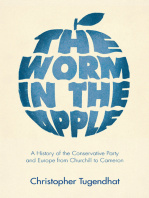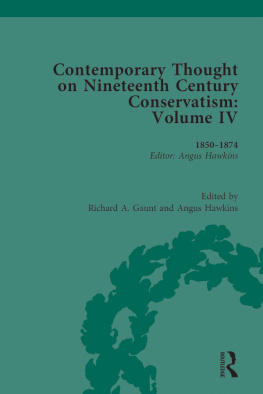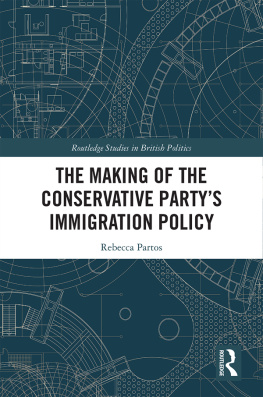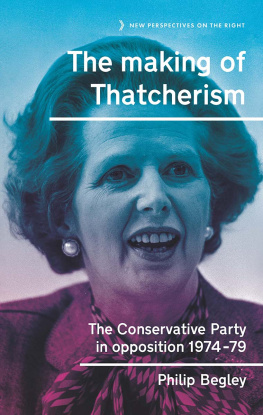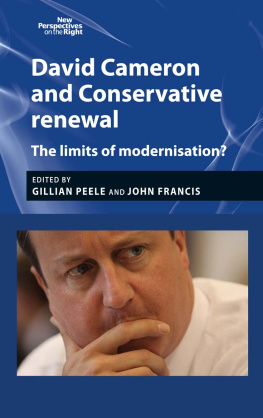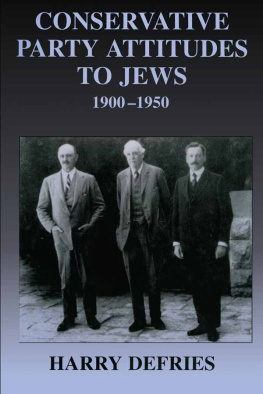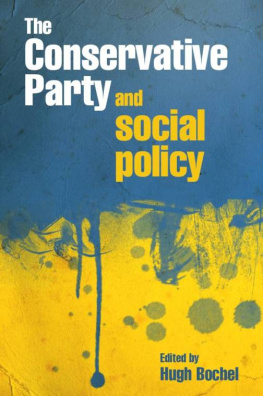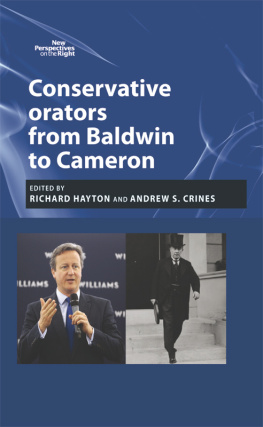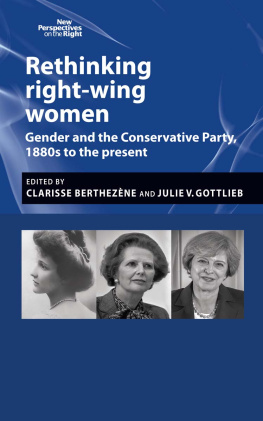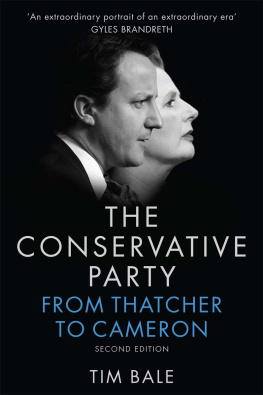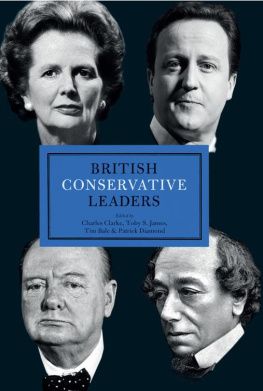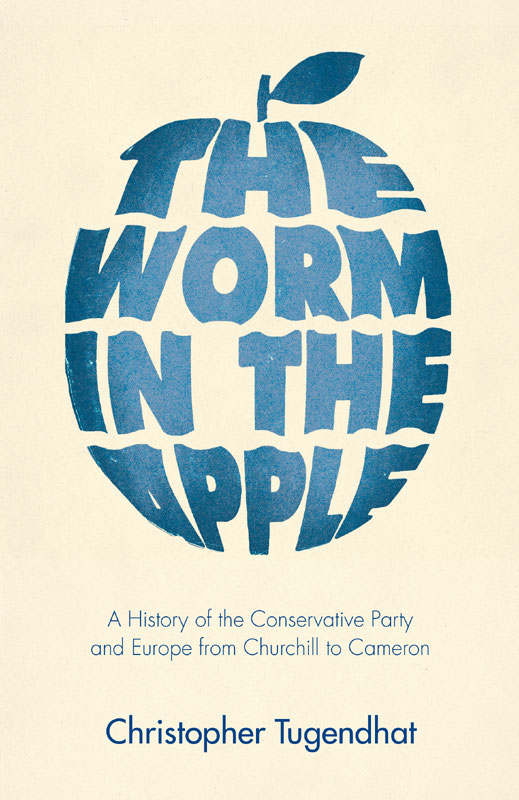
THE WORM IN THE APPLE
CHRISTOPHER TUGENDHAT
The Worm in the Apple
A History of the Conservative Party and
Europe from Churchill to Cameron

Published in 2022 by
Haus Publishing Ltd
4 Cinnamon Row
London sw11 3tw
Copyright Christopher Tugendhat, 2022
A CIP catalogue for this book is available from the British Library
The moral right of the author has been asserted
ISBN 978-1-913368-53-1
eISBN 978-1-913368-54-8
Typeset in Sabon by MacGuru Ltd
Printed in the UK by Clays Ltd, Elcograf S.p.A.
www.hauspublishing.com
@HausPublishing
For Julia, for ever and always
Contents
Introduction
The controversy within the Conservative Party over Europe was for sixty-five years an enduring drama of British politics from Churchills decision not to join the original European Coal and Steel Community (ECSC) in 1951 to Camerons decision to hold an In/Out referendum in 2016. Other incidents came and went. It was always there, sometimes in the foreground, at others behind the scenes. It destabilised British foreign policy, corroded the body politic, and destroyed several of the partys leaders.
The drama was sustained by a sequence of ifs. If Churchill, and Eden, had not turned their backs on the original enterprise in the 1950s; if Macmillan in 1961 and Heath in 1973 had not rejected advice to come clean with the people about the sovereignty implications of membership; if President Valry Giscard dEstaing of France and Chancellor Helmut Schmidt of West Germany had not tried to browbeat Margaret Thatcher when she became prime minister in 1979; if her fall in 1990 had not left a legacy of bitterness about Europe; if she had not undermined her successor, John Major, after he had negotiated the Maastricht Treaty in 1992; if, after 1997, the Conservative Party had not paved the way for UKIP and fallen in thrall to its agenda; if immigration into Britain from other European Union (EU) countries had not increased so much after the enlargement of the EU in 2004; if, if, if
These possibilities and how they panned out created a deep, grumbling discontent the worm in the apple that, over time, turned the Conservative Party and, by extension, a significant section of the electorate against British membership of the EU. While the outward form of the membership remained unchanged, the worm ate away at its legitimacy. To understand why Britain voted to leave in 2016, it is necessary to understand the arguments and divisions within the Conservative Party that began under Churchill and reached their apotheosis under Cameron. They are by no means the whole story, but they are an important part of it.
In 1972, as a Conservative MP, I voted in favour of the highly contentious European Communities Act, which enabled Britain to join the European Economic Community (EEC) on 1 January 1973. In the 1975 referendum, I campaigned with other members of my party for Britain to remain a member. When Thatcher was prime minister, I was a European commissioner in Brussels. When I returned to Britain in 1985, I wrote a book about the future of Europe. Since the early 1990s, I have been a member of the House of Lords, participating in debates on European issues. In the 2016 referendum, I voted to remain.
Now, fifty years after the epic Parliamentary battles generated by the 1972 act, I explain how the worm entered the apple; why it flourished; how the apple might have been saved; and the factors, going back over many decades, that contributed to the result of the 2016 referendum and so to British withdrawal.
1
Missed Opportunities 19461959
Dean Acheson, who served as American secretary of state during the post-war years, entitled his autobiography Present at the Creation. He was justified in doing so. During the decade after 1945, almost all the great international organisations with which we are familiar today, or their predecessors, were established the United Nations, the International Monetary Fund, the World Bank, the World Trade Organization, the World Health Organization, the North Atlantic Treaty Organization, the European Union, and others. In all bar one of these that have had Britain as a member, British ministers and officials played a major role in setting them up and forming their working practices.
The exception is the European Union (EU), which began with the European Coal and Steel Community (ECSC), established in 1951 by France, West Germany, Italy, the Netherlands, Belgium, and Luxembourg. The same six countries then created the European Economic Community (EEC) in 1957; after various enlargements and reforms, this became the EU in 1993. In the aftermath of the war, the architects of those institutions would have welcomed British participation. But both Clement Attlees Labour government and its Conservative successor under Winston Churchill declined to join the ECSC, and Anthony Edens Conservative administration decided against the EEC. When, in 1961, Harold Macmillan wanted to reverse that decision, General de Gaulle, as president of France, imposed a veto. A second attempt in 1967 by the Labour prime minister Harold Wilson met the same fate. Only after the generals departure was the Conservative Ted Heath able to lead Britain into the EEC on 1 January 1973.
From this simple fact stems many of the grievances and misunderstandings that bedevilled Britains relationship with the other member states and the European Commission during the next forty-seven years. By the time Britain joined, the essential character of the organisation, its institutional structure, its working methods, its core policies, and its aspirations had been established. So, too, had the language and imagery in which those aspirations were clothed. There had been no British input. It had been formed by alien ideas and principles and was based on unfamiliar practices mainly, but not only, French.
In other international organisations, British ministers and officials felt instantly at home; in the EEC, everything was unfamiliar. Over time by which I mean decades as officials built their careers dealing with Brussels and negotiating with the other member states, sections of the British civil service became as familiar with the system as those of other countries. This was never true of ministers. It is striking, however, how often they changed their minds, usually grudgingly and without enthusiasm, as they discovered how British interests, both within Europe and beyond, could be furthered and maintained through the endless negotiations that characterise the EUs working methods.
As for the British public, the consequences of our late arrival quickly became apparent to me when, in 1977, as a newly appointed commissioner, I began addressing audiences in both Britain and other member states on European issues. I found that most people in this country simply did not feel the same sense of commitment towards, or faith in, the European venture as their counterparts in other European countries.
The differences were fundamental. People in other member states, not everyone everywhere but a solid and sufficient core, regarded the European venture as a means of overcoming the historic rivalries of the past that had led to war, and adapting them to peaceful purposes for which it was worth sacrificing elements of national sovereignty. A belief that I shared. The British, apart from a small minority, were untouched by this sense of historic purpose and regarded joining the Common Market, as they generally then called the EEC, in purely economic and utilitarian terms.
Next page
